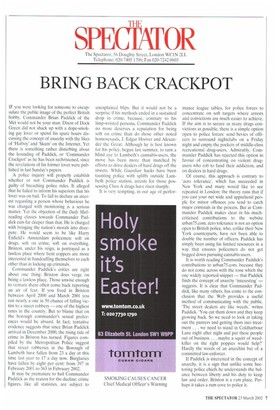BRING BACK CRACKPOT
IF you were looking for someone to encapsulate the public image of the perfect British bobby. Commander Brian Paddick of the Met would not be your man. Dixon of Dock Green did not shack up with a dope-smoking gay lover or spend his spare hours discussing the concept of anarchy with the likes of `Hatboy' and `Skum' on the Internet, Yet there is something rather disturbing about the hounding of Paddick, or 'Commander Crackpot' as he has been rechristened, since the revelations of his former lover were published in last Sunday's papers.
A police inquiry will properly establish whether or not Commander Paddick is guilty of breaching police rules. It alleged that he failed to inform his superiors that his lover was on bail. To fail to declare an interest regarding a person whose behaviour he was charged with monitoring is a serious matter. Yet the objection of the Daily Mailreading classes towards Commander Paddick cuts far deeper than that. He is charged with bringing the nation's morals into disrepute. He would seem to be like Harry Enfield's Amsterdam policemen: soft on drugs, soft on crime, soft on everything. Brixton, under his reign, is portrayed as a lawless place where bent coppers are more interested in handcuffing themselves to each other than in locking up criminals.
Commander Paddick's critics are right about one thing: Brixton does verge on being a lawless place. Those unwise enough to venture there often come back reporting an air of fear. If you lived in Brixton between April 2000 and March 2001 you ran nearly a one in 50 chance of falling victim to a street robbery — one of the highest rates in the country. But to blame that on the borough commander's sexual preferences would be absurd. In fact, tentative evidence suggests that since Brian Paddick arrived in December 2000, the rising tide of crime in Brixton has turned. Figures compiled by the Metropolitan Police suggest that street robberies in the Borough of Lambeth have fallen from 23 a day at this time last year to 17 a day now. Burglaries have fallen by eight per cent: from 397 in February 2001 to 363 in February 2002.
It may be premature to hail Commander Paddick as the reason for the decline: crime figures, like all statistics, are subject to unexplained blips. But it would not be a surprise if his methods ended in a sustained drop in crime, because. contrary to his limp-wristed persona, Commander Paddick no more deserves a reputation for being soft on crime than do those other noted homosexuals, J. Edgar Hoover and Alexander the Great. Although he is best known for his policy, begun last summer, to turn a blind eye to Lambeth's cannabis-users, the move has been more than matched by efforts to drive dealers of hard drugs off the streets. While Guardian hacks have been taunting police with spliffs outside Lambeth police station, arrests for those possessing Class A drugs have risen sharply.
It is very tempting, in our age of perfor mance league tables, for police forces to concentrate on soft targets where arrests and convictions are much easier to achieve. If the aim is to secure as many drugs convictions as possible, there is a simple option open to police forces: send bevies of officers to surround nightclubs on a Friday night and empty the pockets of middle-class recreational drug-users. Admirably, Commander Paddick has rejected this option in favour of concentrating on violent drugusers who rob to fund their addiction, and on dealers in hard drugs.
Of course, this approach is contrary to 'zero tolerance', which has succeeded in New York and many would like to see repeated in London: the theory runs that if you cast your net wide and apprehend people for minor offences you tend to catch major criminals in the process. But as Commander Paddick makes clear in his muchcriticised contributions to the website urban75.com, zero tolerance is not an option open to British police, who, unlike their New York counterparts, have not been able to double the number of officers. Paddick has simply been using his limited resources in a way that ensures policemen do not get bogged down pursuing cannabis-users.
It is worth reading Commander Paddick's contributions to urban75.com, because they do not come across with the tone which the one widely reported snippet — that Paddick finds the concept of anarchy 'interesting' — suggests. It is clear that Commander Paddick, like many others, has come to the conclusion that the Web provides a useful method of communicating with the public. 'The street dealers are like weeds,' writes Paddick. 'You cut them down and they keep growing back. So we need to look at taking out the punters and getting them into treatment . we need to stand in Coldharbour Lane night after night and put these people out of business . . . maybe a squirt of weedkiller on the right poppies would help?' Hardly the words of an anarchist but of a committed law-enforcer.
If Paddick is interested in the concept of anarchy, it is a sign that unlike some hectoring police chiefs he understands the balance between liberty and his duty to keep law and order. Brixton is a rum place. Perhaps it takes a rum cove to police it.


















































































 Previous page
Previous page